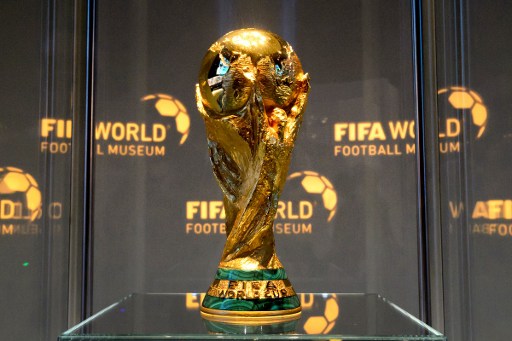Fifa approves expanded 48-team World Cup

This file photo taken on February 28, 2016 shows the World Cup trophy at the FIFA World Football Museum during its inauguration.
FIFA’s ruling council on January 10, 2017 unanimously approved an expansion of the World Cup to 48 teams in 2026, with a format of 16 groups of three nations. AFP FILE PHOTO
ZURICH, Switzerland—Fifa voted to expand the World Cup to 48 teams from 2026 in a victory on Tuesday for its president Gianni Infantino but derided by critics as driven by money and politics.
In a deeply divisive move which will enrich scandal-tainted Fifa’s coffers, its ruling council unanimously adopted an expanded format with 16 groups of three nations that will bring “benefits without negatives,” said Infantino.
Article continues after this advertisement“We have to shape the World Cup of the 21st Century… football is more than Europe and South America,” the Fifa president, who had pushed hard for the change, said after the vote.
“Many more countries will have the chance to dream.”
It represents the first major alteration to the World Cup since the tournament was boosted from 24 to the current 32 teams for the 1998 tournament in France.
Article continues after this advertisementBut its many critics strongly oppose the latest move and it was branded a “money grab and power grab” by New Fifa Now, a group campaigning for reform of FIFA.
READ: European clubs call on Fifa not to expand 32-team World Cup
Infantino took over the body 11 months ago with a vow to repair the damage done during Sepp Blatter’s tenure by growing football across the globe.
READ: Infantino FIFA reign starts with budget flight
Enlarging the World Cup was the centrepiece of that vision, but opponents say a bigger tournament will dilute the quality of play and overburden already exhausted players, particularly in Europe’s money-rich leagues.
Football’s powerful European Club Association reiterated its strong opposition, describing the current World Cup model as “the perfect formula”.
“We understand that this decision has been taken based on political reasons rather than sporting ones and under considerable political pressure, something ECA believes is regrettable,” the body which represents Europe’s leading clubs said in a statement.
Javier Tebas, president of the Spanish La Liga, made no attempt to hide his disgust.
“Fifa is doing politics. Gianni Infantino is doing politics,” he thundered.
“To be elected he promised more countries at the World Cup. He wants to honor his electoral promises. But the promises made to professional football, he’s not sticking to.
“It is without our agreement and it makes us very angry.”
European governing body UEFA offered a tepid acceptance, saying it decided to back the plan once “it was clear that all other confederations were overwhelmingly in favour”.
Big winners, big money
The new format envisages 80 matches — 16 more than the current set-up — but crucially will still be played over the same 32 days, a nod to opponents who fear player burn-out.
Two teams from each group will advance to a 32-nation knock-out round.
A confidential Fifa report seen by Agence France-Presse projects a 48-team tournament would bring a cash boost of $640 million (605 million euros) above projected revenues for next year’s finals in Russia.
Africa and Asia could be the big winners with a rise in their number of World Cup places — currently five for Africa and between four and five for Asia.
A source close to FIFA told AFP that Europe could get 16 places, an increase of three, with Africa earning nine.
Infantino said no decision was made on how the extra places would be allocated, but assured all regions “will get more” berths.
The council weighed five proposals during the meeting at FIFA’s snow-covered Zurich headquarters, including maintaining the status quo of 32 teams.
Defending Infantino, CONCACAF chief Victor Montagliani said there was unanimous backing because the debate was based on “facts and the figures, not on a wink and nod”.
“Maybe the time has come where we don’t do things on winks and nods anymore,” added the head of North and Central America’s governing body, in a clear jibe at the disgraced Blatter administration and the corruption that threatened to bring Fifa to its knees.
Some have pointed to Euro 2016 — which expanded to 24 nations — as evidence that competition can remain fierce with more countries involved, noting the stunning achievements of football minnows such as Iceland and Wales.
Who will host 2026?
Bidding to host the 2026 tournament has not yet opened, but Fifa opened the door to shared hosting among up to three countries.
Montagliani, a Canadian, said a joint US-Canada-Mexico bid was “possible”, while Morocco has also been mentioned as a possible candidate.
Tuesday’s landmark decision is the latest overhaul of the World Cup, which has seen its global popularity and financial might surge since the inaugural edition in 1930.
That contest, won by Uruguay, had just 13 countries.
The World Cup expanded to 24 teams in 1982 in Spain before moving to its current 32-team version in 1998.